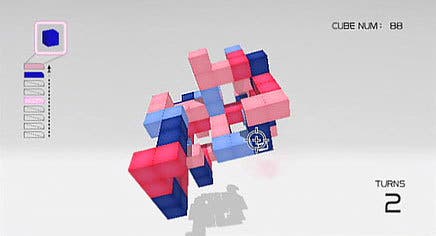Art Style WiiWare Roundup
Cubello, Rotohex and Orbient.
All the way back in 2005, the Game Boy Advance benefited from a range of seven games under the Bit Generations banner. Simple and affordable, they delivered ingenious nuggets of gaming using basic controls and concepts. Or at least, they did in Japan. The rest of the world never got an official taste of these dinky delights.
Thankfully, the world of WiiWare is perfect for just this sort of gaming, so original developer Skip Ltd has rejigged two of the seven, redubbed them Art Style, and added an all-new title for good measure. In keeping with the old cheap n' cheerful approach of Bit Generations, each game costs just 600 Wii Points (that's around GBP 4.20 / EUR 5.40) and will take up only a tiny amount of your precious Wii memory.
But are they any good?
Cubello
The only one of the three Art Style games not to have its roots in the GBA era, Cubello should be a striking example of how the simple, graceful Bit Generations ethos can evolve to take advantage of the Wii. And it is. Mostly.
At its core, the game is another colour-matching puzzler in which putting four blocks of the same hue next to each other makes them vanish. As always, the goal is to get rid of all the blocks. Mixing things up is the fact you're not just guiding tumbling blocks down a flat plane, but firing them at a constantly rotating geometric structure, using the remote to aim at the facets of the cubes as they swing past.

This structure is inexorably moving towards you, and it's Game Over should it get too close. The only way to nudge it backwards is - yes - to keep chaining together strings of destroyed blocks. There's an immense sense of satisfaction to be found clearing huge swathes of blocks with a well-placed shot. Just by making it a 3D structure, there's a more tangible payoff to successful play. You're not simply erasing lines of flat shapes, but dismantling an apparently solid object.
The 3D is more than just gimmick as well. Success isn't just about putting blocks in the right place, it's about firing blocks at the right time. The structure's rotation is dictated by your shots, so a hit on a protruding extremity can send it spinning rapidly in the opposite direction, while a hit closer to the centre has a less violent impact. This extra wrinkle means that there are dual strategies to be satisfied, and players who like to evolve deeper tactics over prolonged play will be most satisfied.
In concept there's a neat balance of old and new, while the clean, crisp presentation fits well with the stripped-down approach of the series. Sadly though, the gameplay balance that made the original Bit Generations series so fiendishly moreish is somewhat askew here. The game is tough, giving you no more than a few seconds to start knocking blocks off before the proximity klaxon starts to sound, and with no way to discard unwanted colours, clearing those last few blocks can be a frustrating to-and-fro of building up cluttered spires of superfluous cubes while hoping for the colour you need to finally get rid of a solitary group of three.
Often, the only way to effectively clear the stage is to make use of Bonus Time, during which you get an unlimited number of blocks of the same colour. Once all blocks of that colour have been eliminated, the colour changes and you can start chipping away at another set. Trouble is, you have no control over Bonus Time. It's triggered by a series of tumblers in the top right, and only when they match up do you hit the jackpot and get to make big useful strides towards the finish line.
By tying efficient progress to this random system, rather than old-fashioned player skill, Cubello ultimately fumbles the delicate balancing act, which can be the difference between a very good puzzler and a great one, and so it proves.
7/10

